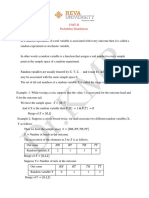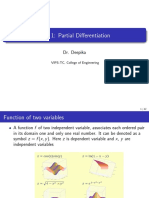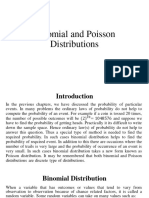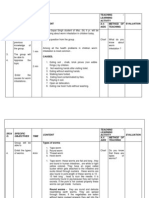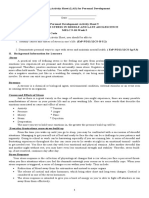Statistics Unit 5 Notes
Uploaded by
gopscharanStatistics Unit 5 Notes
Uploaded by
gopscharanStatistics
UNIT 5 PROBABILITY DISTRIBUTIONS
Notes 5.2
Probability Distributions
In this chapter we will investigate discrete probability distributions and study measures of
central tendency and dispersion for such distributions.
Random Variable - A variable that assumes a unique numerical value for each of the outcomes
in the sample space of a probability experiment.
It is called "random" because the value it assumes is the result of a chance, or
random, event.
Typically, the discrete random variable is a count of something.
Illustration 1
We toss five coins and observe the number of heads visible. What value(s) may the random
variable x take on?
Illustration 2
We roll two dice and observe the sum of the dots on both dice. What value(s) may the random
variable x take on?
Illustration 3
Let the number of phone calls received per day by a company be a random variable. What
value(s) may the random variable x take on?
Probability Distribution - A distribution of the probabilities associated with each of the values
of a random variable. The probability distribution is a theoretical
distribution; it is used to represent populations.
Example 1
Create a probability distribution for the random variable x in Illustration 1.
Example 2
Create a probability distribution for the random variable x in Illustration 2.
Example 3
Consider a die that has been modified so it has one face with one dot, two faces with two dots,
and three faces with three dots. Let x be the number of dots observed with this die is rolled.
Create a probability distribution for the random variable x .
***Properties of Probability Distributions***
1)
0 each ( ) 1 P x
2)
all
( ) 1
x
P x
Example 4
Is ( )
10
x
P x for x = 1, 2, 3, and 4 a probability function?
What is P(5)?
Example 5
Is
2
( )
5
x
P x
for x = 3, 4, and 5 a probability function?
Statistics
Notes 5.2
Mean, Variance, Standard Deviation, and Expectation
The mean, variance, and standard deviation for a probability distribution are computed
differently from the mean, variance, and standard deviation for samples.
Mean of a Variance of a St. Deviation of a
Prob. Distribution Prob. Distribution Prob. Distribution
[ ] ( ) x P x
2 2 2
( ) x P x 1
]
2 2
( ) x P x 1
]
Ex. Find the mean, variance, and standard deviation of the number of spots that appear when
a die is tossed.
Ex. In a family with 2 children, find the mean and standard deviation of the number of
children who will be girls.
Ex. If three coins are tossed, find the mean and standard deviation of the number of heads
that will occur.
Ex. In a restaurant the following probability was obtained for the number of items a person
ordered for a large pizza.
Number of Items (x) 0 1 2 3 4
Probability (P(x)) 0.3 0.4 0.2 0.06 0.04
Find the mean, variance, and standard deviation for the distribution.
Ex. The probability that 0, 1, 2, 3, or 4 people will be placed on hold when they call a radio
talk show is shown in the distribution. Find the mean, variance, and standard deviation.
The radio has four phone lines.
Number on Hold (x) 0 1 2 3 4
Probability (P(x)) 0.1
8
0.3
4
0.2
3
0.21 0.04
Expectation
Related to the concept of the mean for a probability distribution is the concept of expected value
or expectation. Expected value is used in various types of games of chance, in insurance, and in
other areas, such as decision theory.
** The expected value is the theoretical mean of the probability distribution **
Ex. One thousand tickets are sold at $1 each for a color TV valued at $350. What is the
expected value if a person purchases one ticket?
Ex. A ski resort loses $70,000 per season when it does not snow very much and makes
$250,000 profit when it does snow a lot. The probability of it snowing at least 75 inches
(i.e., a good season) is 40%. Find the expectation for profit.
Ex. One thousand tickets are sold at $1 each for four prizes of $100, $50, $25, and $10. What
is the expected value if a person purchases two tickets? Assume a person can win only
one prize.
** In gambling games, if the expected value is 0, the game is said to be fair. If the expected
value is positive, the game is in favor of the player. If the expected value is negative, the game is
said to be in favor of the house. **
Statistics
Notes 5.3
The Binomial Probability Distribution
Directions: Circle the best answer to each question.
1. A B C
2. A B C
3. A B C
4. A B C
5. A B C
Questions
1. How many of the five questions do you think you answered correctly?
2. If an entire class answered the quiz by guessing, what do you think the average number of
correct answers would be?
3. What is the probability that you selected the correct answers to all five questions?
4. What is the probability that you selected the wrong answers for all five questions?
Find:
1) P(x = 0)
2) P(x = 1)
3) P(x = 2)
4) P(x = 3)
5) P(x = 4)
6) P(x = 5)
Binomial Probability Experiment - An experiment that is made up of repeated trials of a basic
experimental event. The binomial experiment must
possess the following properties:
1. Each trial has two possible outcomes (success, failure)
2. There are n repeated independent trials.
3. P(success) = p, P(failure) = q, and p + q = 1
4. The binomial random variable x is the count of the number of successful trial that
occur; x may take on any integer value from zero to n.
Illustration 8
Consider the roll of a die, where one or something else occurs.
p = q =
Illustration 9
If you were an inspector on a production line in a plant where television sets were manufactured,
you would be concerned with identifying the number of defective television sets.
p = q =
Illustration 10
Is the experiment of flipping a coin three times and recording the number of heads that occur a
binomial probability experiment?
The probability that a random variable x takes on a particular value in a binomial experiment is
always the product of three basic factors:
1. the probability of exactly x successes,
x
p
2. the probability that failure will occur on the remaining (n - x) trials,
n x
q
.
3. the number of ways that exactly x successes can occur in n trials
The number of ways that exactly x successes can occur in a set of n trials is represented by the
symbol
n
x
_
,
or
n x
C
which must always be a positive integer. This is termed the binomial coefficient. The binomial
coefficient is found by using the formula
!
!( )!
n
n
x x n x
_
,
Evaluate each of the following.
1) 5!
2)
8!
4!
3)
6!
3!(6 3)!
4)
6
2
_
,
5) 1!
6) 0!
Binomial Probability Function
If, for a binomial experiment, p is the probability of a success and q is the probability of a failure
on a single trial, then the probability
( ) P x
that there will be exactly x successes in n trials is
( )
x n x
n
P x p q
x
_
,
for x = 0, 1, 2, 3, ..., n
Illustration
Consider an experiment that calls for drawing five cards, one at a time with replacement, from a
well-shuffled deck of playing cards. The drawn card is identified as a spade or not a spade,
returned to the deck, the deck reshuffled, and so on. The random variable x is the number of
spades observed in five drawings.
Find the binomial probability function.
Use the binomial probability function to find
( ) P x
for each value of x.
Illustration
The manager of Steves Market guarantees that none of his cartons of one dozen eggs will
contain more than one bad egg. If a carton contains more than one bad egg, he will replace the
whole dozen and allow the customer to keep the original eggs. The probability that an individual
egg is bad is 0.05. What is the probability that Steve will have to replace a given carton of eggs?
Mean and Standard Deviation of the Binomial Distribution
The mean and standard deviation of a theoretical binomial probability distribution can be found
by using these two formulas:
Mean of a Variance of a Standard Deviation of a
Binomial Random Variable Binomial Random Variable Binomial Random Variable
np
2
npq npq
Illustration
Recall the case of tossing three coins. n = 3 and p = . Find the mean and standard deviation
for the number of times a heads occurs.
Illustration
Find the mean and standard deviation of the binomial distribution when n = 20 and p =
1
5
.
You might also like
- Conversion To Christianity Among The Nagas100% (4)Conversion To Christianity Among The Nagas44 pages
- Vertical Vapor Liquid Separator Sizing: Chemical Engineering CalculationsNo ratings yetVertical Vapor Liquid Separator Sizing: Chemical Engineering Calculations8 pages
- Unit 1: Partial Differentiation: Dr. DeepikaNo ratings yetUnit 1: Partial Differentiation: Dr. Deepika42 pages
- Mathematica Practicals For Differential EquationsNo ratings yetMathematica Practicals For Differential Equations6 pages
- Formula For Standard Error of The Mean: Standard Deviation / Sample SizeNo ratings yetFormula For Standard Error of The Mean: Standard Deviation / Sample Size30 pages
- Maths Grade 12 New Textbook @ethiopian - Digital - Library100% (2)Maths Grade 12 New Textbook @ethiopian - Digital - Library386 pages
- Addis Ababa Science & Technology University Department of Electrical & Computer EngineeringNo ratings yetAddis Ababa Science & Technology University Department of Electrical & Computer Engineering63 pages
- Statistical Quality Control Questions-1No ratings yetStatistical Quality Control Questions-113 pages
- Second Order Linear Differential Equation With Constant CoefficientsNo ratings yetSecond Order Linear Differential Equation With Constant Coefficients7 pages
- Chapter One 1. Overview of Basic of Probability Theory 1.1No ratings yetChapter One 1. Overview of Basic of Probability Theory 1.111 pages
- Partial Differential Equations (Pde'S) : Muhammad Usman HamidNo ratings yetPartial Differential Equations (Pde'S) : Muhammad Usman Hamid118 pages
- Bayes Theorem - Conditional Probability - Solved ExamplesNo ratings yetBayes Theorem - Conditional Probability - Solved Examples2 pages
- A Module On Introduction and Measuring Errors in Numerical Methods PDFNo ratings yetA Module On Introduction and Measuring Errors in Numerical Methods PDF32 pages
- Ch.-1 Correlation, Regression and Curve FittingNo ratings yetCh.-1 Correlation, Regression and Curve Fitting22 pages
- Applied Mathematics - IIIS.E SEM - III.No ratings yetApplied Mathematics - IIIS.E SEM - III.269 pages
- Application of Derivatives-I - Lecture Notes - NewNo ratings yetApplication of Derivatives-I - Lecture Notes - New30 pages
- Binomial Distribution Questions (Solved)No ratings yetBinomial Distribution Questions (Solved)2 pages
- Random Variable and Mathematical ExpectationNo ratings yetRandom Variable and Mathematical Expectation31 pages
- A Comparison Between Synchronous and Asynchronous Counters: 4-Bit Ripple CounterNo ratings yetA Comparison Between Synchronous and Asynchronous Counters: 4-Bit Ripple Counter3 pages
- Jimma University (JU) Physics DepartmentNo ratings yetJimma University (JU) Physics Department2 pages
- Differential Equations-1st Order, 1st DegreeNo ratings yetDifferential Equations-1st Order, 1st Degree9 pages
- Chapter - 3 Equilibrium: Engineering Mechanics100% (1)Chapter - 3 Equilibrium: Engineering Mechanics6 pages
- Discrete Random Variables and Probability Distributions: Presented By: Juanito S. Chan, PIE, ASEAN Engr. (AE 0490)No ratings yetDiscrete Random Variables and Probability Distributions: Presented By: Juanito S. Chan, PIE, ASEAN Engr. (AE 0490)53 pages
- Chapter III. Discrete Probability DistributionNo ratings yetChapter III. Discrete Probability Distribution13 pages
- Application of Theory in Nursing ProcessNo ratings yetApplication of Theory in Nursing Process4 pages
- Tyler Objective Model Group PresentationNo ratings yetTyler Objective Model Group Presentation23 pages
- Urinary Tract Infections in Children: Diagnostic Imaging Based On Clinical Practice GuidelinesNo ratings yetUrinary Tract Infections in Children: Diagnostic Imaging Based On Clinical Practice Guidelines60 pages
- Child Welfare Services Assignment On Child Abuse and NeglectNo ratings yetChild Welfare Services Assignment On Child Abuse and Neglect12 pages
- Case Presentation On: Transposition of The Great ArteriesNo ratings yetCase Presentation On: Transposition of The Great Arteries2 pages
- Medical Center Map - Directions - Hotel Information PDFNo ratings yetMedical Center Map - Directions - Hotel Information PDF3 pages
- Joining The Ties of Kinship - Islamic NetworkNo ratings yetJoining The Ties of Kinship - Islamic Network4 pages
- PCS 7 APACS OS Symbols and Faceplates V6.1No ratings yetPCS 7 APACS OS Symbols and Faceplates V6.166 pages
- Definition of Distribution Logistics From The Producer To The CustomerNo ratings yetDefinition of Distribution Logistics From The Producer To The Customer2 pages
- AT Attachment With Packet Interface - 7 Volume 1No ratings yetAT Attachment With Packet Interface - 7 Volume 1390 pages
- MOCK PAPER 1 Marking Scheme November Exam AASLNo ratings yetMOCK PAPER 1 Marking Scheme November Exam AASL32 pages
- African Daisy Orange: Dimorpotheca Greek Dis (Twice) + Morphe (Shape) + Theka (A Fruit)No ratings yetAfrican Daisy Orange: Dimorpotheca Greek Dis (Twice) + Morphe (Shape) + Theka (A Fruit)11 pages
- Vertical Vapor Liquid Separator Sizing: Chemical Engineering CalculationsVertical Vapor Liquid Separator Sizing: Chemical Engineering Calculations
- Formula For Standard Error of The Mean: Standard Deviation / Sample SizeFormula For Standard Error of The Mean: Standard Deviation / Sample Size
- Maths Grade 12 New Textbook @ethiopian - Digital - LibraryMaths Grade 12 New Textbook @ethiopian - Digital - Library
- Addis Ababa Science & Technology University Department of Electrical & Computer EngineeringAddis Ababa Science & Technology University Department of Electrical & Computer Engineering
- Second Order Linear Differential Equation With Constant CoefficientsSecond Order Linear Differential Equation With Constant Coefficients
- Chapter One 1. Overview of Basic of Probability Theory 1.1Chapter One 1. Overview of Basic of Probability Theory 1.1
- Partial Differential Equations (Pde'S) : Muhammad Usman HamidPartial Differential Equations (Pde'S) : Muhammad Usman Hamid
- Bayes Theorem - Conditional Probability - Solved ExamplesBayes Theorem - Conditional Probability - Solved Examples
- A Module On Introduction and Measuring Errors in Numerical Methods PDFA Module On Introduction and Measuring Errors in Numerical Methods PDF
- Application of Derivatives-I - Lecture Notes - NewApplication of Derivatives-I - Lecture Notes - New
- A Comparison Between Synchronous and Asynchronous Counters: 4-Bit Ripple CounterA Comparison Between Synchronous and Asynchronous Counters: 4-Bit Ripple Counter
- Discrete Random Variables and Probability Distributions: Presented By: Juanito S. Chan, PIE, ASEAN Engr. (AE 0490)Discrete Random Variables and Probability Distributions: Presented By: Juanito S. Chan, PIE, ASEAN Engr. (AE 0490)
- Urinary Tract Infections in Children: Diagnostic Imaging Based On Clinical Practice GuidelinesUrinary Tract Infections in Children: Diagnostic Imaging Based On Clinical Practice Guidelines
- Child Welfare Services Assignment On Child Abuse and NeglectChild Welfare Services Assignment On Child Abuse and Neglect
- Case Presentation On: Transposition of The Great ArteriesCase Presentation On: Transposition of The Great Arteries
- Medical Center Map - Directions - Hotel Information PDFMedical Center Map - Directions - Hotel Information PDF
- Definition of Distribution Logistics From The Producer To The CustomerDefinition of Distribution Logistics From The Producer To The Customer
- African Daisy Orange: Dimorpotheca Greek Dis (Twice) + Morphe (Shape) + Theka (A Fruit)African Daisy Orange: Dimorpotheca Greek Dis (Twice) + Morphe (Shape) + Theka (A Fruit)


